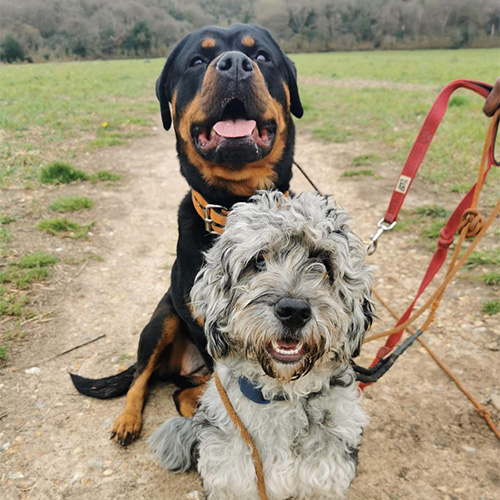


THE HOUND HUB
How socialisation is important for your dogs development
Help & Advice
9 April 2024
Socialisation is a critical aspect of a dog's development and plays a crucial role in shaping their behaviour, temperament, and overall well-being. It involves exposing dogs to a wide range of people, animals, environments, and experiences from a young age to help them become well-adjusted, confident, and adaptable companions throughout their lives.
Firstly, socialisation helps dogs develop positive relationships and interactions with people, including family members, friends, strangers, and children. Dogs that are well-socialised from a young age are more likely to feel comfortable and confident in various social settings, reducing the risk of fear, anxiety, or aggression towards unfamiliar individuals. This fosters positive experiences and relationships between dogs and people, enhancing the dog's overall quality of life and strengthening their bond with their owners.
Moreover, socialisation promotes appropriate behaviour and communication with other animals, including dogs, cats, and small animals. Dogs that are exposed to a variety of animals during the socialisation process are more likely to exhibit friendly, non-threatening behaviour towards them, reducing the risk of aggression, fear, or territoriality. This facilitates positive interactions and play experiences with other animals, promoting social skills, cooperation, and mutual respect between species.
Additionally, socialisation helps dogs adapt to various environments, stimuli, and experiences encountered in everyday life. Dogs that are exposed to different environments, such as parks, streets, vehicles, and public spaces, from a young age are more likely to feel confident and relaxed in new or unfamiliar settings. This reduces the risk of fear, anxiety, or stress-related behaviours when encountering novel stimuli, such as loud noises, unfamiliar objects, or unpredictable situations.
Furthermore, socialisation enhances a dog's ability to cope with change, transition, and new experiences throughout their lives. Dogs that are well-socialised from puppyhood are better equipped to handle life's challenges, including moving to a new home, travelling, visiting the veterinarian, or encountering changes in routine or environment. This promotes resilience, adaptability, and emotional stability, enabling dogs to navigate life's ups and downs more effectively.
Moreover, socialisation reduces the risk of behavioural problems and aggression in dogs by exposing them to various stimuli and experiences in a controlled and positive manner. Dogs that lack adequate socialisation may develop fear, anxiety, or reactivity towards unfamiliar people, animals, or environments, leading to undesirable behaviours such as aggression, avoidance, or excessive barking. By providing early and ongoing socialisation opportunities, owners can help prevent the development of these issues and promote more desirable behaviours in their dogs.
In conclusion, socialisation is essential for promoting the physical, mental, and emotional well-being of dogs and plays a vital role in shaping their behaviour, temperament, and relationships throughout their lives. By exposing dogs to a wide range of people, animals, environments, and experiences from a young age, owners can help their dogs become confident, adaptable, and well-adjusted companions who can navigate the complexities of the modern world with ease.

For more information on how we can help, please contact us using the form below:
For more information on how we can help, please contact us using the form below:


